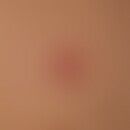DefinitionThis section has been translated automatically.
Acetylcholine (from Latin acetum = vinegar; Greek chole = bile), ACh for short, is a biogenic amine that plays a central role as a neurotransmitter in the autonomic nervous system. It controls vital functions such as breathing, blood pressure, heartbeat, digestion and metabolism. Curare, for example, which has become known as the poison of the arrow, clearly demonstrates the importance of acetylcholine: it blocks the acetylcholine receptors and thus blocks the entire peripheral nervous system.
ClinicThis section has been translated automatically.
Increased salivation in the mouth can occur due to a reduction in acetylcholine.
For various Sialorrhoea has been described as a side effect of various drugs. Mucosa-irritating antibiotics, cardiac glycosides, nicotine, caffeine, quinine, theophylline, reserpine, clonazepam, morphine as well as mercury and thallium or apomorphine.
Sialorrhoea can occur independently of the amount of saliva as well as with increased saliva production, which is called hypersecretion or hypersalivation.
Outgoing links (6)
Acetylcholine; Clonazepam; Coffein; Quinine; Reserpin; Theophylline ethylenediamine;Disclaimer
Please ask your physician for a reliable diagnosis. This website is only meant as a reference.



